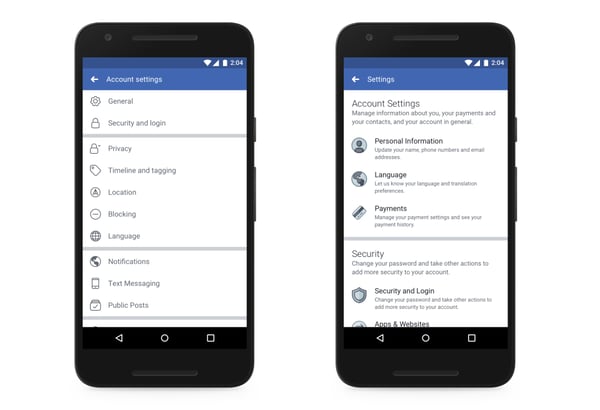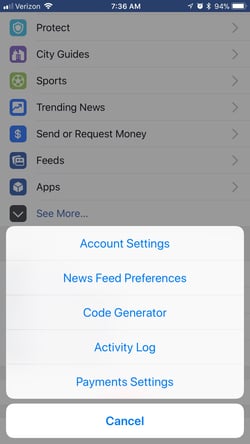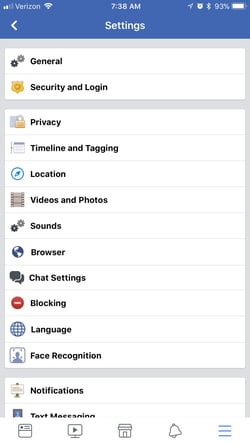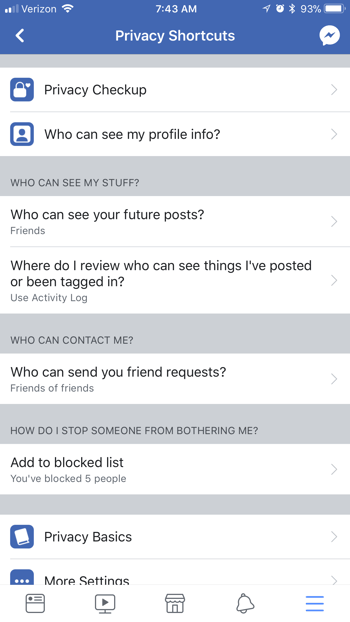Facebook Is Updating Its Privacy Tools. Here's a Look at What to Expect.
Facebook announced this morning that it will roll out changes to its privacy tools to make them clearer and easier to find.
The announcement, penned by Facebook's VP and Chief Privacy Officer Erin Egan and VP/Deputy General Counsel Ashlie Beringer, led with an acknowledgment of how confusing the privacy tools were previously -- with a claim that the new updates "have been in the works for some time" but were prompted by "the events of the past several days."
Those events, of course, refer to the fallout Facebook has experienced from the alleged spread and misuse of personal user data from analytics firm Cambridge Analytica.
These changes will be made "in the coming weeks," the announcement said -- and when I re-downloaded the Facebook mobile app (the latest version available on iOS after the announcement was published), I didn't see the updates described and illustrated in this morning's statement.
That said, here's what Facebook says we can expect.
1. "Controls That Are Easier to Find and Use"
According to Egan and Beringer's announcement, the settings menu has been redesigned on the Facebook mobile app to help make controls easier to find. Previously, account (and other) settings were distributed among 20 different pages -- but now, Facebook says, they'll be accessible from one place.
Here's a before-and-after snapshot:

Source: Facebook
Again, when I tried to access my own account and privacy settings, I didn't see any changes. Here's what mine looked like:


Additionally, the statement says, Facebook has "cleaned up outdated settings so it’s clear what information can and can’t be shared with apps."
2. "New Privacy Shortcuts Menu"
There's been a "privacy shortcuts" menu on the Facebook mobile app for a while now, but according to the statement, users can expect major changes.
Here's what they look like now, on my app:

With the updates, however, these shortcuts should be "clearer, more visual, and easy-to-find." They'll include capabilities like adding such protections as two-factor authentication for more secure logins -- that's the message you receive when you log in from a new device and have to confirm if it's actually you.
The shortcuts will also include personal information controls that allow users to review what they’ve shared, and delete it if they want to -- including posts shared or reacted to, friend requests sent, and Facebook search history.
The privacy shortcuts will also include ad controls, allowing users to manage the data used by Facebook to determine which ads to show you. However, in the announcement, users are directed to the platform's ad preferences for an explanation of how ads work.
Finally, the new privacy shortcuts will include user management of who sees their Facebook posts and profile.
These features and controls are not entirely new, but the gist of the statement is that they should now be easier for users to access and change.
3. "Tools to Find, Download and Delete Your Facebook Data"
Facebook's new privacy tools will also introduce something called "Access Your Information," which Egan and Beringer describe as "a secure way for people to access and manage their information" -- things like their posts, search history, and the various other treasures that can be found in your data file.
Access Your Information will also allow users to delete anything from their timelines and profiles that they no longer want on Facebook -- with, we can only assume and hope, with greater ease.
It'll also be easier to download said data file, according to the announcement -- with the option to "move it to another service," which could be faced with trepidation by many users, given the current scrutiny around personal data ending up in the hands of others. Again, here's some of what that data file includes, and what happened when I downloaded mine.
Looking ahead, Facebook has a great deal of ground to cover in terms of re-earning user trust, especially when considering recent data from a Reuters/Ipsos poll indicating that it falls short when compared to some of its Big Tech counterparts.
The thesis of Facebook's communication in the days following these data misuse allegations is that it's open to change and transparency -- even if that means losing revenue and having to bow to the regulation it's seemingly worked to avoid.
Mark Zuckerberg is reported to be testifying before Congress -- specifically, the House Energy and Commerce, which Politico expects to take place as soon as April 12 -- and the company postponed plans to debut a suite of hardware products at its F8 developer conference in May (though it does say it still plans to eventually release them).
I'll be monitoring the situation as it continues to unfold. Questions? Feel free to weigh in on Twitter.
Featured image credit: Facebook
from Hubspot
Comments
Post a Comment